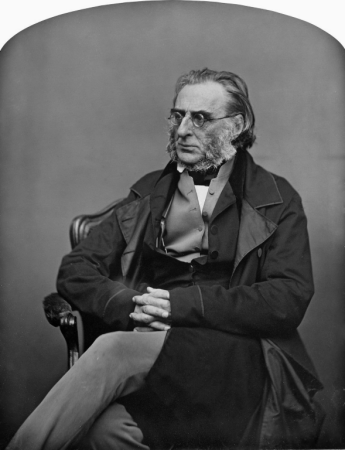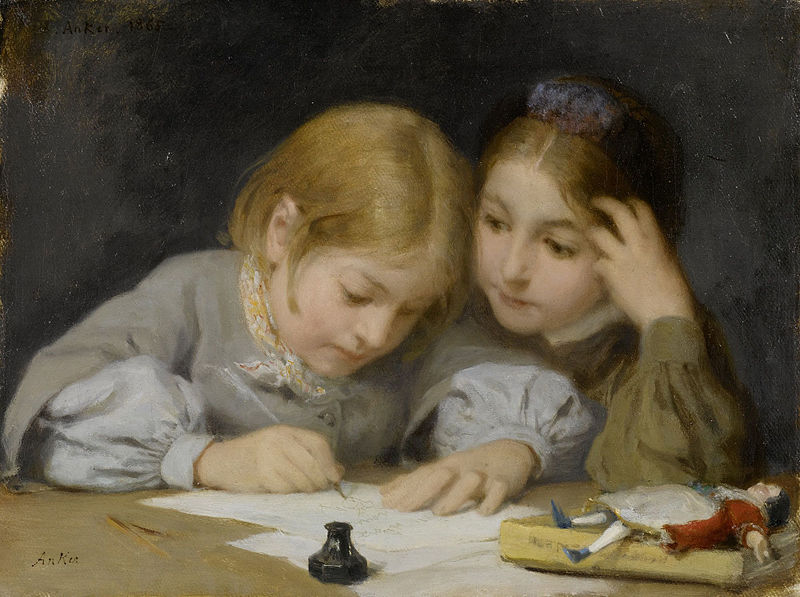What should we make of the idea that there’s no such thing as objective morality: that morals are just determined by cultures, or by individuals? That’s at the heart of a question that I address in the essay below. It’s taken from a draft of a midterm that I wrote dealing with moral relativism — more specifically, the cultural relativism advocated by Ruth Benedict, who claimed that “good” and “evil” are socially determined.
In the paper I argue against Benedict’s cultural relativism, in favor of the moral absolutism advocated by the British Catholic analytical philosopher Elizabeth Anscombe:
One of the most pernicious developments in contemporary philosophy is the rise of a moral relativism that rejects the existence of any absolute, universal moral claims. In a real way, it is diametrically opposed to the moral absolutism of the twentieth century philosopher G.E.M. Anscombe. Nevertheless, the two antipodes each reveal an important dimension of the social role of conscience-forming. This paper will proceed by considering the appeal of, and arguments for moral relativism; the arguments against moral relativism; and the interplay between moral relativism and Anscombe’s moral philosophy on the question of conscience.
 |
| Melanesian Seafaring, Fiji (1842) |
The rise of moral relativism is closely related to the process of globalization. In earlier times, when individuals were exposed primarily or exclusively to their own cultures, it was easy to imagine that one’s culture’s morals simply reflected morality. The spread of Christianity throughout Europe (and Islam throughout much of the rest of the world) had a similarly homogenizing effect on morality: pagan mores gave way to an Abrahamic moral code that held largely intact from one nation to another. What was immoral in France was likely immoral in Scotland, Spain, and Switzerland as well. This moral uniformity lent itself strongly to the suggestion that these mores reflected the natural law, that these were objective rules of morality existing apart from any particular culture.
As Christianity’s influence on European and North American culture waned, this uniformity began to break down. Simultaneously, anthropologists, sociologists, and historians began to examine cultures with moral systems dramatically distinct from, and even diametrically opposed to, Christian culture. For example, anthropologist Ruth Benedict argues against moral objectivity by telling stories about the (allegedly) paranoid and violent culture on Dobu island in northwest Melanesia, a culture that she described as treating violence as acceptable, while ostracizing the kind and helpful.1 In the light of these alien moral codes, what had once looked like common-sense moral rules reflecting a universal human consensus now appeared to be arbitrary social conventions. The cultural relativist argues on this basis that the notion of an objective and transcultural morality is illusory.
Instead, the argument goes, we must learn to value tolerance, since to insist upon Christian morality would be an arrogant imposition of our own culture. Certainly, the morals on Dobu seem barbaric and evil, but Benedict argues that “the very eyes with which we see the problem are conditioned by the long traditional habits of our own society.”2 That is, we see Dobu morality as wicked because we approach it with Western eyes. They would likewise see Western morality as wicked, given their own cultural formation.
Without question, G.E.M. Anscombe, whose adherence to moral absolutism is well-established, would reject moral relativism of this sort. Francis J. Beckwith gives several reasons why in answering the above line of argumentation. First, this cultural relativism conflates preference-claims with moral-claims, so that “killing people without justification is wrong” is treated as a merely subjective preference, like “I like vanilla ice cream.”3 Second, relativism is premised off of the idea that, since cultures cannot agree on what objective morality is, there must be no objective morality. Logically, the conclusion does not hold: the people of Dobu might have cosmological and scientific beliefs radically at odds with Western cosmology and science, but we would not rationally conclude that, therefore, there must be no objective cosmology or science. Worse, if the mere existence of disagreement means that the belief is not objectively true, then the disagreement over cultural relativism disproves it.4 Third, the cultural relativists typically exaggerate the disagreements between cultures, and ignore underlying commonalities between moral codes.
 |
| General Sir Charles James Napier (1849) |
Additional problems with cultural relativism can be seen from the real-life encounter of General Sir Charles James Napier, British Commander-in-Chief in India from 1849 to 1851, with certain Hindu priests. The priests were protesting the British ban on Sati, the practice of burning a widow alive on her husband’s funeral pyre. They argued that Sati “was a religious rite which must not be meddled with,” and “that all nations had customs which should be respected and this was a very sacred one.”5 Napier responded:
Be it so. This burning of widows is your custom; prepare the funeral pyre. But my nation has also a custom. When men burn women alive we hang them, and confiscate all their property. My carpenters shall therefore erect gibbets on which to hang all concerned when the widow is consumed. Let us all act according to national customs.”6
Napier’s response highlights several problems facing cultural relativism. Where cultures clash, whose moral code should triumph? For the British to “tolerate” Sati would involve violating their own moral codes. For that matter, whose morals should triumph within a particular culture? Should the Indian brides simply “tolerate” being thrown into the flames against their wills because of popular morality? Or should cultural morality simply be decided by the powerful imposing their will – be that the Indians forcing brides onto the pyre, or the British forcing them to stop? Quickly, this devolves into pure Nietzschean will to power.
As Beckwith notes, “cultural relativism is making an absolute and universal moral claim, namely, that everyone is morally obligated to follow the moral norms of his or her own culture.”7 This is problematic, both in that it is self-refuting (since the crux of cultural relativism is the rejection of such absolute an universal moral claims) and that it would eliminate any possible social progress, since no one could upset the moral norms of his or her own culture. For that matter, the whole notion of social progress would have to be rejected, since “progress” implies some comparison of a culture to an external standard of some kind.8
 |
| Albert Anker, Writing Classes (1865) |
That moral relativism cannot be endorsed in toto does not mean that it is entirely without merit. Take, for instance, this claim by Ruth Benedict:
The concept of the normal is properly a variant of the concept of the good. It is that which society has approved. A normal action is one which falls well within the limits of expected behavior for a particular society. Its variability among different peoples is essentially a function of the variability of the behavior patterns that different societies have created for themselves, and can never be wholly divorced from a consideration of cultural institutionalized types of behavior.9
As a description of the good, this account is inadequate, for the reasons discussed above. However, as a description of the influence of societies in the formation of individual consciences, it highlights a real phenomenon. In Anscombe’s words, “it belongs to the natural history of man that he has a moral environment,” such that it is impossible to raise a child without this being the case.10 This moral environment includes the deliberate influence of the child’s parents, but it also includes the society in which the child is raised. A child raised in the notoriously-violent Yąnomamö culture will be shaped differently than a child raised in a strictly-pacifistic Quaker community, and their approach towards moral reasoning will likely reflect this upbringing, at least initially. Benedict and the cultural relativists are right, therefore, to see culture as playing an indispensable role in the formation of individual consciences.
In fact, Anscombe and Benedict arrive at similar conclusions for the class of cases that Anscombe would describe as involving “invincible ignorance,” which she defines as “ignorance that the man himself could not overcome.”11 Thus, if Abner has been taught of a certain affirmative duty, and Charles has never been taught about this (and has no reason to suspect its existence), Abner is morally responsible for his failure to perform the duty, while Charles is not. For Benedict, this distinction would be explained by reference to the differing cultural norms facing Abner and Charles. For Anscombe, it would be explained by reference to Charles’ invincible ignorance. Nevertheless, the conclusion would reached along somewhat similar lines: because the two men received different moral instructions, they are held to differing standards.
 |
| Albert Anker, Writing Boy (1883) |
Here, the agreement between Anscombe and Benedict ceases. In two major areas, they would decisively part company on the question of conscience. The first is on the relationship of social moral pedagogy to objective morality. Benedict viewed it as disproving the existence of objective morality, at least in any transcultural sense: that is, because cultures indoctrinate in differing, and even contrary ways, there can be no binding transcultural morality. Anscombe would disagree, holding that some societies are simply better or worse at moral formation, just as some parents are. Both parents and the culture possess a certain moral authority in the upbringing of children, yet Anscombe noted that this authority “is not accompanied by any guarantee that someone exercising it will be right in what he teaches.”12 Acculturation and indoctrination must therefore be compared to an external standard of objective morality. Accordingly, we can affirm that some parents or cultures create a moral environment suitable for raising virtuous individuals, while others fail to do so, or succeed in creating viscous persons.
The second area of disagreement between Anscombe and Benedict on the question of conscience involves the degree to which the individual’s socially formation is fixed. Certainly, Benedict speaks of cultural morality as a static thing: an individual believes such-and-such because these are the values of his culture. As Beckwith notes, the rigidity of such a view leaves no room for moral reformers like the leaders of the Civil Rights movement.13 Nor does it seem to leave room for individuals like Benedict herself, whose belief in cultural relativism was a radical break from her native culture’s moral outlook. Anscombe rightly rejects Benedict’s rigid view, holding instead that an individual may move closer to (or further from) objective morality throughout his life. She describes the context in which children come to reject their parents’ moral authority; the same is surely true of societies.14 Individuals need not live out their entire lives blindly accepting a particular thing as true simply because society says so.
These two points prove to be crucial. Because conscience can be malformed, the individual may face a genuine moral perplexus in which every course of action is morally wrong:
If you act against your conscience you are doing wrong because you are doing what you think wrong, i.e. you are willing to do wrong. And if you act in accordance with your conscience you are whatever is the wrong that your conscience allows, or failing to carry out the obligation that your conscience says is none.15
This moral perplexus is only comprehensible in light of the fact that relativism is wrong. We would otherwise have to affirm that “there’s no such thing as false conscience. Conscience is conscience and infallibly tells you what is right and what is wrong. So conscience always binds, or else legitimately leaves you morally free to do or not do.”16
So, having rejected moral relativism, we are left facing a moral perplexus. Here, it is important that Benedict was mistaken to view socially-formed conscience as static or fixed. It is precisely in the ability of the conscience to be formed, even in adulthood, that Anscombe finds a solution to the perplexus, saying: “There is a way out, but you have to know that you need one and it may well take time. The way out is to find out that your conscience is a wrong one.”17 That is, the long-term solution to the perplexus problem is to repair the damage inflicted upon your conscience, whether that damage was self-inflicted, or the result of a bad moral environment.
A major part of the appeal of moral relativism is that it tells a half-truth: culture really does influence the way that individuals approach morality. A proper moral environment is invaluable, if not indispensable. But this reality does not point to the absence of objective morality. Rather, as Anscombe shows, it points to the need of properly forming one’s conscience, and ensuring a healthy moral environment for the rearing of children. To fail to take these steps risks placing you or your children in a moral perplexus, in which every possible action is morally wrong.
- Ruth Benedict, “A Defense of Moral Relativism,” in Do the Right Thing: Readings in Applied Ethics and Social Philosophy, 2nd Edition, ed. Francis J. Beckwith (Belmont, CA: Wadsworth/Thompson Learning, 2002), 9.
- Id. at 6.
- Francis J. Beckwith, “A Critique of Moral Relativism,” in Do the Right Thing: Readings in Applied Ethics and Social Philosophy, 2nd Edition, ed. Francis J. Beckwith (Belmont, CA: Wadsworth/Thompson Learning, 2002), 13.
- Id.
- William Napier, History of General Sir Charles Napier’s Administration of Scinde (London: Chapman and Hall, 1851), 35.
- Id.
- Beckwith, “A Critique of Moral Relativism,” 17.
- Id.
- Benedict, “A Defense of Moral Relativism,” 10.
- G.E.M. Anscombe, “The Moral Environment of the Child,” in Faith in a Hard Ground, ed. Mary Geach and Luke Gormally (Charlottesville, VA: Imprint Academic, 2008), 224.
- G.E.M. Anscombe, “On Being in Good Faith,” in Faith in a Hard Ground, ed. Mary Geach and Luke Gormally (Charlottesville, VA: Imprint Academic, 2008), 111.
- G.E.M. Anscombe, “Authority in Morals,” in Faith in a Hard Ground, ed. Mary Geach and Luke Gormally (Charlottesville, VA: Imprint Academic, 2008), 93.
- Beckwith, “A Critique of Moral Relativism,” 17.
- Anscombe, “Authority in Morals,” 94.
- G.E.M. Anscombe, “Must One Obey One’s Conscience?,” in Human Life, Action and Ethics, ed. Mary Geach and Luke Gormally (Charlottesville, VA: Imprint Academic, 2005), 241.
- Id. at 239.
- Id. at 241.

It seems to me that morality is a natural reality derived from the fact that human life is governed by natural laws under which all animal life lives by, each in it’s own particular way. The above mentioned reference to children illustrates this well. As another example we can consider the fact that even ancient animals such as monstrous sized crocodiles are very caring towards their babies, witnessed in their gently protecting them in their mouths and guarding them with their when any suspected danger approaches. ( It is the natural law that keeps them from chewing and swallowing them!) Also, how careful are penguins in the protection of their chicks, or Kangaroos for their joeys? And humans are under the same natural law. Humans live by the same effects of the “biological clock” for both men and women, and the entire aging process exhibits a manifestation of the natural law as it is played out in our lives. Insanity, it seems, could be defined as a complete mental and physical disregard for the biological and sociological rules these of natural laws, wherein such neglect leads to excessive or erratical ‘unnatural’ behavior. But it also seems that for most people, these natural laws and natural habits are so ingrained in our behaviors as to be
‘second nature’ and, for the most part, invisible to our notice except when the laws are excessively violated. It seems also, that this ‘violation’ seems to be a suitable definition of the term ‘sin’. By learning about and remembering these invisible laws of nature, human society helps to prevent excesses and deviations from the natural laws for the future, thereby providing for the more efficient happiness, growth and propagation of the human species. Adherence to these innate natural laws seems to define the term morality.
This is off the top of my head, so please correct me if I’ve missed something.
Awlms,
What you said is true to a point, but there’s a limit to it. Many species of animals, despite being caring to their young, also engage in actions that we would find unconscionable in humans (for example, a great many species reproduce by rape). So a purely Darwinian account can say “such-and-such an action is evolutionarily beneficial,” but can’t say if it’s morally right or wrong. A good moral system is capable of critiquing the evils in your society, and even within your own impulses and your own heart.
I.X.,
Joe
Joe, yes, it was a very quick and limited analysis. And, I really should have provided some context, such as having said that everything that I mentioned above also assumed that God is the Creator and sustainer of the natural law. I believe that the Natural Law is His supremely exquisite work which He himself termed ‘good’. And also into which the Word of God, Jesus, was born, nurtured and grown. Jesus also used the natural law in many ways to teach and enlighten us,describing it in parables and also by manipulating or suspending it through miracles. Moreover, He redeemed us by means of it in the sacrifice of the cross on Calvary, uses it to be present to us in the transubstantiation of bread and wine in the Holy Eucharist and triumphed over it completely and eternally in His resurrection from the Dead.
So, even though I admire studies in evolution, I believe that God directs all evolution and at every moment of existence.
And this is why it is so pleasing to join in the Canticle of Daniel, wherein he exults:
Bless the Lord, all you works of the Lord
Praise and exalt Him above all forever
Angels of the Lord bless the Lord.
You heavens, bless the Lord
All you waters above the heavens, bless the Lord
All you hosts of the Lord, Bless the Lord
Sun and Moon, Bless the Lord
Stars of heaven, bless the Lord.
Every shower and dew, bless the Lord.
All you winds, bless the Lord
Fire and Heat, bless the Lord
Cold and chill, bless the Lord
Dew and rain, bless the Lord
Frost and chill, bless the Lord
Ice and Snow, bless the Lord
Nights and days, bless the Lord
Light and darkness, bless the Lord
Lightings and clouds, bless the Lord
Let the earth bless the Lord
Praise and exalt Him above all forever.
*****
Amen